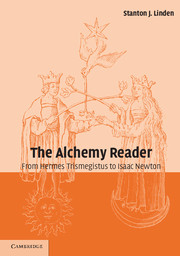Book contents
- Frontmatter
- Contents
- List of illustrations
- Acknowledgments
- List of abbreviations
- Illustrations
- Introduction
- Part I Ancient texts
- 1 HERMES TRISMEGISTUS: The Emerald Table (Tabula Smaragdina)
- 2 PLATO (c. 427-347 BC): From the Timaeus
- 3 ARISTOTLE (384-322 BC): From the Meteorology
- 4 PSEUDO-DEMOCRITUS (first or second century AD): From The Treatise of Democritus On Things Natural and Mystical
- 5 ANONYMOUS (first or second century AD): Dialogue of Cleopatra and the Philosophers
- 6 ANONYMOUS (late third century AD): From Leyden Papyrus X and the Stockholm Papyrus
- 7 ZOSIMOS OF PANOPOLIS (fl. c. 300 AD): Of Virtue, Lessons 1–3
- 8 STEPHANOS OF ALEXANDRIA (first half of seventh century AD): From The Great and Sacred Art of the Making of Gold
- 9 ANONYMOUS (eighth or ninth century AD): The Poem of the Philosopher Theophrastos Upon the Sacred Art
- Part II Islamic and medieval texts
- Part III Renaissance and seventeenth-century texts
- Glossary
- Bibliography
- Index
9 - ANONYMOUS (eighth or ninth century AD): The Poem of the Philosopher Theophrastos Upon the Sacred Art
Published online by Cambridge University Press: 05 October 2014
- Frontmatter
- Contents
- List of illustrations
- Acknowledgments
- List of abbreviations
- Illustrations
- Introduction
- Part I Ancient texts
- 1 HERMES TRISMEGISTUS: The Emerald Table (Tabula Smaragdina)
- 2 PLATO (c. 427-347 BC): From the Timaeus
- 3 ARISTOTLE (384-322 BC): From the Meteorology
- 4 PSEUDO-DEMOCRITUS (first or second century AD): From The Treatise of Democritus On Things Natural and Mystical
- 5 ANONYMOUS (first or second century AD): Dialogue of Cleopatra and the Philosophers
- 6 ANONYMOUS (late third century AD): From Leyden Papyrus X and the Stockholm Papyrus
- 7 ZOSIMOS OF PANOPOLIS (fl. c. 300 AD): Of Virtue, Lessons 1–3
- 8 STEPHANOS OF ALEXANDRIA (first half of seventh century AD): From The Great and Sacred Art of the Making of Gold
- 9 ANONYMOUS (eighth or ninth century AD): The Poem of the Philosopher Theophrastos Upon the Sacred Art
- Part II Islamic and medieval texts
- Part III Renaissance and seventeenth-century texts
- Glossary
- Bibliography
- Index
Summary
Stephanos of Alexandria exerted a powerful influence on the rhetorical practice of Greek writers of the seventh and eighth centuries, one that is visible in four alchemical poems often preserved together in manuscript under the names of Heliodoros, Theophrastos, Hierotheos and Archelaos. Close analysis of style and content has led to the conclusions that these poems are the work of one anonymous writer who lived after the time of Stephanos, and that all are versifications of passages from his Great and Sacred Art of the Making of Gold. The following poem ascribed to Theophrastos was probably written by a Byzantine sophist between the years 700 and 900 AD.
In the commentary accompanying his translation of the poem, C. A. Browne describes the radical change in the style of scientific (and alchemical) writing that occurs in the last centuries of the first millennium:
The science of the early Alexandrians had so far degenerated in the days of the Byzantines that it was made a theme for rhetoricians while the ancient clarity and conciseness, which made the scientific writings of Hippocrates and Archimedes models of expression, had now given way to deliberate obscurity of thought and to empty jingling of an inflated style (212).
Despite rhetorical extravagance, culminating in the outburst of praise, “O work divine, well-pleasing and concise!,” this poem attributed to Theophrastos is interesting not only for its approach to the mysteries of alchemy but for the light that it throws on the Sophists.
- Type
- Chapter
- Information
- The Alchemy ReaderFrom Hermes Trismegistus to Isaac Newton, pp. 61 - 68Publisher: Cambridge University PressPrint publication year: 2003



